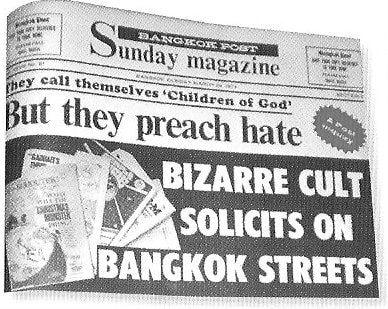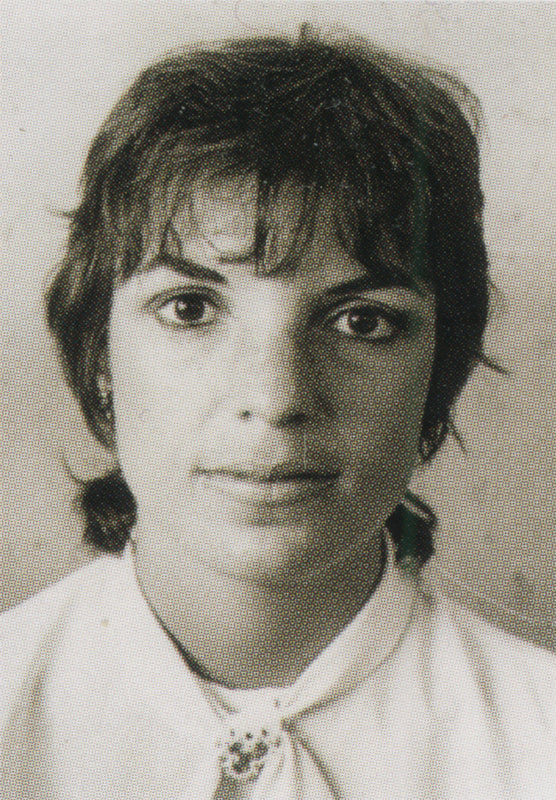By Maxmilian Wechsler
The BigChilli takes a look back at the sad, shocking and mystery-shrouded murder of Claudia Ross. In March 1974 Claudia Ross, an American-born sub-editor and investigative reporter for the Bangkok Post, was stabbed to death in her Bangkok home. The murder remains unsolved. Whenever there is a crime with a foreign connection in Thailand, attention from the media and the public is always more intense, and that may partly explain why after many years the brutal murder is still vividly remembered by so many Thais and expats. Bizarre circumstances, inept police work and the failure to bring anyone to justice have also played a part.
| Turbulent times BROOKLYN-born Claudia Ross came to Thailand in 1972 and witnessed frst-hand one of the most turbulent periods in the country’s history. The Vietnam War was in full swing, with thousands of American civilian and military personnel in the country. GI’s on R&R from Vietnam filled up Bangkok hotels and apartments. Heroin was easily available and used by locals as well as foreigners. |
The anti-American and especially anti-CIA sentiment was strong, and there was a communist insurgency going on in the countryside. In October 1973 an army crackdown on a massive student-led demonstration around Democracy Monument in Bangkok left scores of demonstrators dead.
It was an exciting political and social climate for a young reporter, and according to friends, Claudia seemed unconcerned about the possible dangers of looking too closely into controversial issues. She was one of a tight-knit group of American correspondents who worked for various media organisations based at the U-Chuliang.
Building on Rama 4, where the offces of the Bangkok Post were located at the time. Claudia was known as a fearless reporter with a strong sense of justice. She once said to colleagues: “I am not doing anyone any harm, why should they do anything to me?” Claudia and her Irish roommate, Lillian Wood s, lived in a small wooden house just off Soi Yenakart close to Sathorn and Rama 4 roads.
Many foreigners travelling on the cheap stayed in the area in budget hotels and guesthouses or rented apartments or houses. Heroin use was reportedly widespread, but crime, and especially violent crime was unheard of in the area. That is until police arrived at about 3am on March 29 after neighbours heard screams coming from Claudia’s house.
The police report says she was stabbed five times with a knife. A stab wound to the heart was apparently the cause of death. A typewriter taken from her room was found nearby, and several weeks later a white handbag believed to have belonged to the victim was found in a sewer. Right away theories surfaced about a possible connection to a story she’d written or an investigation she was conducting, but nothing was ever proven. Among the proposed killers were the Children of God, who was the subject of a highly critical piece she wrote for the Post just days before the murder, and the CIA. Claudia was known to be deeply suspicious if the US intelligence agency and was believed to be looking into its operations in Thailand.
Claudia’s close relationship with Bangkok’s expat journalist community helps explain why the news of her killing quickly went international. The New York Times ran a story the second day after the murder and followed up with several more. Other well-known publications followed suit. To honour her memory and journalistic courage the Claudia Ross Memorial Award for Investigative Reporting was established by the Florida Press Association and the University of Florida.
It was an exciting political and social climate for a young reporter, and according to friends, Claudia seemed unconcerned about the possible dangers of looking too closely into controversial issues. She was one of a tight-knit group of American correspondents who worked for various media organisations based at the U-Chuliang.
Building on Rama 4, where the offces of the Bangkok Post were located at the time. Claudia was known as a fearless reporter with a strong sense of justice. She once said to colleagues: “I am not doing anyone any harm, why should they do anything to me?” Claudia and her Irish roommate, Lillian Wood s, lived in a small wooden house just off Soi Yenakart close to Sathorn and Rama 4 roads.
Many foreigners travelling on the cheap stayed in the area in budget hotels and guesthouses or rented apartments or houses. Heroin use was reportedly widespread, but crime, and especially violent crime was unheard of in the area. That is until police arrived at about 3am on March 29 after neighbours heard screams coming from Claudia’s house.
The police report says she was stabbed five times with a knife. A stab wound to the heart was apparently the cause of death. A typewriter taken from her room was found nearby, and several weeks later a white handbag believed to have belonged to the victim was found in a sewer. Right away theories surfaced about a possible connection to a story she’d written or an investigation she was conducting, but nothing was ever proven. Among the proposed killers were the Children of God, who was the subject of a highly critical piece she wrote for the Post just days before the murder, and the CIA. Claudia was known to be deeply suspicious if the US intelligence agency and was believed to be looking into its operations in Thailand.
Claudia’s close relationship with Bangkok’s expat journalist community helps explain why the news of her killing quickly went international. The New York Times ran a story the second day after the murder and followed up with several more. Other well-known publications followed suit. To honour her memory and journalistic courage the Claudia Ross Memorial Award for Investigative Reporting was established by the Florida Press Association and the University of Florida.
| Some unusual suspects The police investigation was surrounded by confusion and controversy from the start, all under a harsh media glare. The police were unprepared for the frenzy brought on by the unprecedented murder of a foreign journalist in Thailand. Police Director-General Prachuab Sunytagkoon assigned the Special Branch to determine if the murder was politically motivated. The police strongly suspected the murderer was a foreigner who Claudia knew, apparently based on shoe prints found at the scene. “If the killer were just an ordinary Thai thief, he would not wear shoes,” the police reasoned. The now-defunct Oui magazine ran an article by Jeremy Doolittle in its February 1975 issue that examines the murder of Claudia Ross, and particularly a possible connection to the Children of God. Court upholds CIA stonewall On March 25, 1992, US District Court Judge Mukasey for the Southern District of New York issued an Opinion and Order in which he dismissed a suit from Grant Peck, editor of Manager Magazine in Bangkok. The suit charged that the CIA had failed to comply with a request for CIA documents on the Claudia Ross case that the plaintiff had filed under the Freedom of Information Act (FOIA) on August 24, 1981. The judge’s decision cited time limits on FOIA requests and included this strange justification for the dismissal of the suit: ‘‘Any person making a request to any agency for records ... shall be deemed to have exhausted his administrative remedies with respect to such request if the agency [emphasis added] fails to comply with the applicable time limit provisions of this paragraph.’’ “It’s a pretty tangled up piece of legalese,” commented one legal expert who saw the document. ‘‘Basically, it looks like the court denied Beck’s suit asking the CIA to release classified documents under the FOIA because the statute of limitations had expired. But it looks like the reason it expired was that the CIA was delaying taking action, or stonewalling. At the end of the document, it says the plaintiff can refile his FOIA request and a new statute of limitations would start from there. Apparently, he didn’t do that, maybe because he figured the result would be the same.” | CIA’s fake letter sparks anti-American ire An article in the Bangkok Post on January 9, 1974, reported that the previous day more than 5,000 angry protesters had flooded Wireless Road outside the US embassy in Bangkok and demanded that Washington recall Ambassador William Kintner and halt all CIA operations in Thailand. The article says the demonstration was sparked ‘‘by revelations that a letter to the Thai government, supposedly written by a communist insurgent leader proposing a ceasefire, had been forged by the CIA. General Saiyud Kerdphol, the [Thai government’s] head of anti-communist operations, protested to the embassy. ‘We are asking them not to interfere,’ he said. Intelligence officers later said that both the CIA and the KGB were engaged in large-scale espionage activities in Thailand.” “On the day I was commissioned an off icer, an old soldier told me – and I have never forgotten his words – ‘Today you are entrusted with America’s most precious gif s, her sons and daughters, in this awesome responsibility you can never fail.’ “My only regret – that I didn’t do better is that some of those young people with whose lives I was entrusted with didn’t come back.” Colonel Redmon and his wife Nuntalux have two children, a son Khunsig, fif een years old, and a daughter Yiwhaa, twelve years old. His favourite activities and hobbies are spending time with his family, hunting, enjoying nature and studying history. |
| The US Embassy in Bangkok showed immediate interest. The embassy sent several cables to the US State Department at the outset of the case. Following is an excerpt from a formerly classifed cable labelled conf dential and dated November 5, 1974, which specifically mentions the Claudia Ross murder: “Continuing allegations of CIA activity in Thailand: Since the exposure in early1974 of the CIAinitiated letter, there has been a continuous and concerted effort by many of your Thai political activists, some newspapers, and a few politicians to claim that the CIA or other off cial Americans are attempting to subvert the Thai political process. “Among the incidents or activities in which these elements would have the Thai public believe we are involved are the following: (A) The still unsolved murder in March 1974 of Claudia Ross, an American journalist with the Bangkok Post. She was supposedly anti-CIA, and perhaps murdered because of this attitude…” In the book Animal Rights: History and Scope of a Radical Social Movement, author Harold D. Guither implies that Claudia was murdered because of an article she wrote on the international wildlife trade. There was also speculation that Claudia’s contacts with Thai dissidents somehow led to her untimely death. Press accounts claimed that Claudia was close to Seksan Prasertkul, one of the most outspoken student leaders of the day. (After October 6, 1976, Thammasat University Massacre Seksan took refuge with communist insurgents in northeastern Thailand. When the Thai government offered amnesty in 1980 to those who had fled to the jungle he surrendered and returned home to Bangkok. |
Many of the suspicions of foul play were centred on the Children of God. Just fve days before the murder, on March 24, the Bangkok Post published a story by Claudia on the front page of its Sunday edition with the headline: “They call themselves ‘Children of God’ but they preach hate.” Underneath was a second big headline written in capital letters: “BIZARRE CULT SOLICITS ON BANGKOK STREETS.” The article was highly critical of the group, which she characterised as “a parasitic cult of Bible-pounding automatons” whose “dogma preaches hate”.
In those days the Children of God were a familiar sight in Bangkok. Made up of Western, hippie-ish vagabonds and their Asian converts, the group gave away pamphlets and invited potential recruits over to their noodle shop. It later came out that before the publication of the story Claudia had visited the noodle shop but didn’t identify herself as a reporter.
The now-defunct Oui magazine ran an article by Jeremy Doolittle in its February 1975 issue that examines the murder of Claudia Ross, and particularly a possible connection to the Children of God. Oui was better known for its erotic photos of young women than its investigative reporting, but the article is an engaging read. Mr Doolittle spent some time with the Children of God in Bangkok and made some interesting observations.
The most provocative part of the article is a paragraph which suggests that the murder was carried out in a ritualistic manner, with heavy Christian symbolism. The next paragraph describes observations attributed to the maid’s brother-in-law, who may have been the only person to get a look at the murderer. The brother-in-law reportedly saw ‘‘a sturdily built man climbing over the garden fence’’. The information given in these two paragraphs doesn’t appear in other media accounts, and unfortunately, the writer doesn’t give sources, whether police, the roommate, neighbours, the brotherin-law or someone else.
Mr Doolittle dispels the notion that the CIA was involved in the murder with the argument that Claudia Ross didn’t pose a serious threat to its covert operations in Thailand and that it would be completely out of character for the agency to kill an American reporter on foreign soil. It’s also true that such an act would be most out of character for the Children of God, now known as The Family International. While the group was involved in some questionable practices back in the 70s that required female members to use their sexuality to attract recruits, they were never known to engage in any violence. And as the Oui article states, the police never found the slightest evidence that the group was involved in the murder. So 43 years later, we are still asking the same question: Who killed Claudia Ross, and why?
The now-defunct Oui magazine ran an article by Jeremy Doolittle in its February 1975 issue that examines the murder of Claudia Ross, and particularly a possible connection to the Children of God. Oui was better known for its erotic photos of young women than its investigative reporting, but the article is an engaging read. Mr Doolittle spent some time with the Children of God in Bangkok and made some interesting observations.
The most provocative part of the article is a paragraph which suggests that the murder was carried out in a ritualistic manner, with heavy Christian symbolism. The next paragraph describes observations attributed to the maid’s brother-in-law, who may have been the only person to get a look at the murderer. The brother-in-law reportedly saw ‘‘a sturdily built man climbing over the garden fence’’. The information given in these two paragraphs doesn’t appear in other media accounts, and unfortunately, the writer doesn’t give sources, whether police, the roommate, neighbours, the brotherin-law or someone else.
Mr Doolittle dispels the notion that the CIA was involved in the murder with the argument that Claudia Ross didn’t pose a serious threat to its covert operations in Thailand and that it would be completely out of character for the agency to kill an American reporter on foreign soil. It’s also true that such an act would be most out of character for the Children of God, now known as The Family International. While the group was involved in some questionable practices back in the 70s that required female members to use their sexuality to attract recruits, they were never known to engage in any violence. And as the Oui article states, the police never found the slightest evidence that the group was involved in the murder. So 43 years later, we are still asking the same question: Who killed Claudia Ross, and why?




 RSS Feed
RSS Feed
















